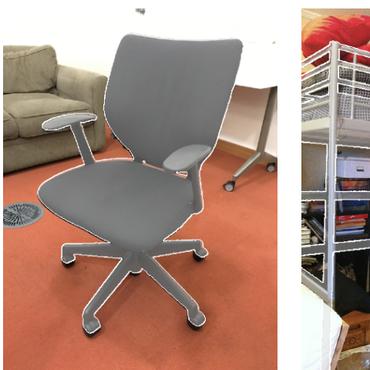Search Results for author: Steven Mills
Found 7 papers, 0 papers with code
RocNet: Recursive Octree Network for Efficient 3D Deep Representation
no code implementations • 10 Aug 2020 • Juncheng Liu, Steven Mills, Brendan McCane
Our network compresses a voxel grid of any size down to a very small latent space in an autoencoder-like network.
Distance Metric Learned Collaborative Representation Classifier
no code implementations • 3 May 2019 • Tapabrata Chakraborti, Brendan McCane, Steven Mills, Umapada Pal
We present a simple effective way of achieving this by learning a generic Mahalanabis distance in a collaborative loss function in an end-to-end fashion with any standard convolutional network as the feature learner.
PProCRC: Probabilistic Collaboration of Image Patches
no code implementations • 21 Mar 2019 • Tapabrata Chakraborti, Brendan McCane, Steven Mills, Umapada Pal
We present a conditional probabilistic framework for collaborative representation of image patches.
CoCoNet: A Collaborative Convolutional Network
no code implementations • 28 Jan 2019 • Tapabrata Chakraborti, Brendan McCane, Steven Mills, Umapada Pal
We present an end-to-end deep network for fine-grained visual categorization called Collaborative Convolutional Network (CoCoNet).
 Fine-Grained Visual Categorization
Fine-Grained Visual Categorization
 Fine-Grained Visual Recognition
+1
Fine-Grained Visual Recognition
+1
Fair Forests: Regularized Tree Induction to Minimize Model Bias
no code implementations • 21 Dec 2017 • Edward Raff, Jared Sylvester, Steven Mills
The potential lack of fairness in the outputs of machine learning algorithms has recently gained attention both within the research community as well as in society more broadly.
LOOP Descriptor: Local Optimal Oriented Pattern
no code implementations • 25 Oct 2017 • Tapabrata Chakraborti, Brendan McCane, Steven Mills, Umapada Pal
This letter introduces the LOOP binary descriptor (local optimal oriented pattern) that encodes rotation invariance into the main formulation itself.
Auto-JacoBin: Auto-encoder Jacobian Binary Hashing
no code implementations • 25 Feb 2016 • Xiping Fu, Brendan McCane, Steven Mills, Michael Albert, Lech Szymanski
Binary codes can be used to speed up nearest neighbor search tasks in large scale data sets as they are efficient for both storage and retrieval.



